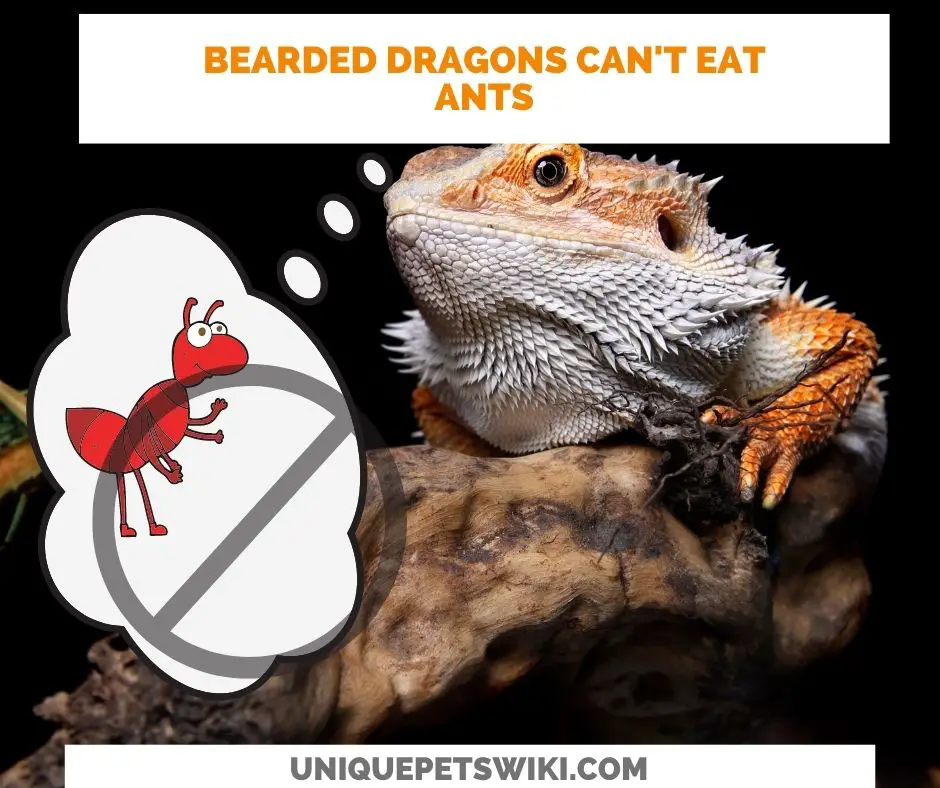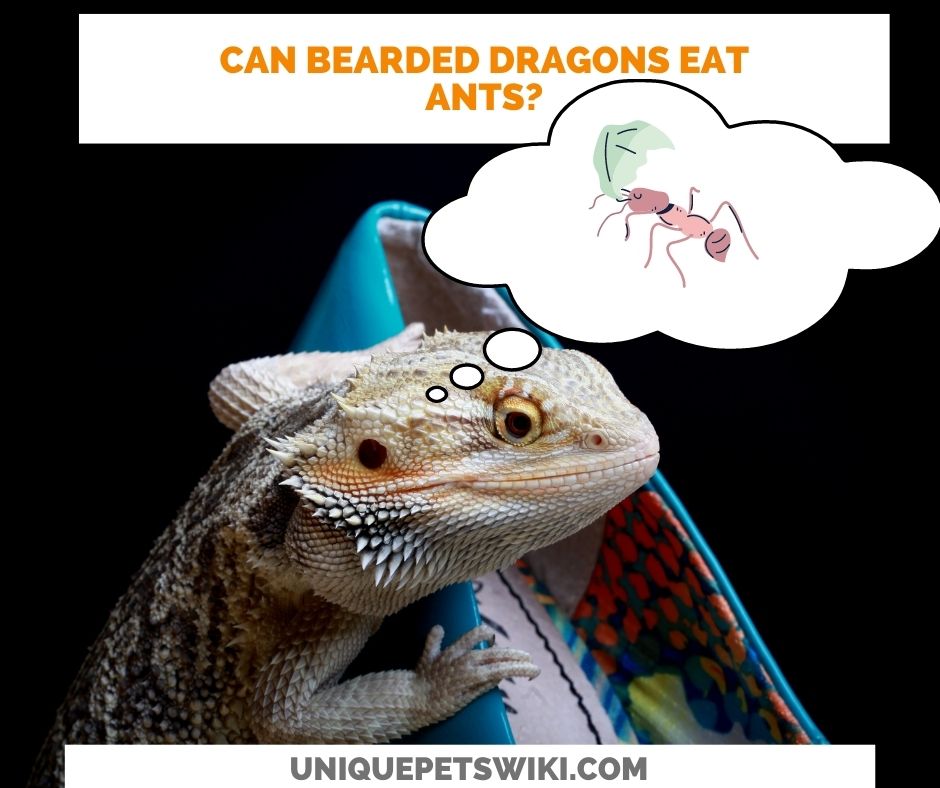You may be curious to know if bearded dragons can eat ants. This is a valid concern, and as a bearded dragon owner, you need to know what is safe for your pet to eat.
Besides vegetables, bearded dragons enjoy munching on insects. However, not all insects are good for the beardies, as some of them are poisonous. So, can you feed ants to your bearded dragon, and are they safe?
Here, we’ll find out if ants are good for the beardies and also get to explore insects that bearded dragons need to eat.
This article has been reviewed by Dr. Dilber. Read more about our knowledge control process here.
Contents
Ants Nutritional Profile

If you are going to feed your beloved lizard with ants, it is paramount first to check out its nutritional content. Consider looking at its protein, calcium, phosphorus, acidic, fat, sugar, and fiber composition, which are of greater interest in respect to bearded dragons.
The list below shows the nutritional content of ants.
| Body part | Moisture (%) | Fat (%) | Ash (%) | Protein (%) | Fibre (%) |
| Thorax | 3.69 | 39.79 | 42.07 | 2.07 | 10.09 |
| Abdomen | 4.36 | 44.64 | 49.77 | 0.95 | 4.31 |
| Whole | 3.93 | 40.83 | 47.51 | 1.55 | 6.91 |
They have between 39.79 to 44.64% protein and about 42.07 to 49.77% fat content depending on the body part. Moreover, ants are rich in protein, fat, iron, zinc, and several acids, including linoleic, oleic, and palmitic.
Ants contain a 1:4 ratio of calcium to phosphorus, respectively, which is risky for bearded dragon’s health.
Can Bearded Dragons Eat Ants?
The truth is ants are dangerous, and bearded dragons should not eat them. Typically, ants defend themselves from bigger predators through biting or stinging and often inject formic acid. Your beardie might be a victim of this chemical injection.

Another reason why you need to avoid having ants in your bearded dragon’s diet is its disproportionate calcium to phosphorus content. As is evident from the list about, ants contain 26mg calcium and 106mg phosphorus.
Phosphorus in excess amounts blocks the absorption of calcium into the bloodstream as it binds to it, forming an insoluble compound. This is dangerous for bearded dragons because it can lead to hypocalcemia and, eventually, metabolic bone disease if the problem persists.
Although ants are excellent sources of protein, they are incredibly high in fat, which is risky for the bearded dragon because of obesity issues. So, for the safety of your beloved lizard, make sure it doesn’t come into contact with ants at any time.
Which Insects are harmful to Bearded Dragons Apart from Ants?
Other than ants, there are several insects which you need to avoid as they are toxic and can make the beardie sick or cause injury. A good example of such insects is; fireflies, scorpions, centipede, wasps, bees, hornets, lubber grasshoppers, some caterpillars, and boxedler.
Also, wild-insects are dangerous to feed to bearded dragons because you aren’t sure if they have chemicals or not. Also, wild-insects might be carrying diseases which they will transmit to your lizard.
What Insects Can Bearded Dragons Eat?
It is a good idea to feed insects to your beardie as they are great sources of protein. Young bearded dragons require plenty of live feeders for their growth and development, and because of that, they will have a huge appetite for insects.
Likewise, adult dragons need a decent amount of protein (about 20%) for the maintenance of muscles. It is, therefore, necessary to ensure that your lizard has access to the right type of insects and in the appropriate amount.
There are several insects that you can confidently feed to your bearded dragon. This includes;
- Crickets
- Hornworms
- Dubia roaches
- Waxworms
- Mealworms
- Silkworms
- Super worms
- Phoenix worms
- Butterworms
- Earthworms
- Calci worms and repti worms
Dubia roaches, crickets, and hornworm (Goliath worms) are good staple insect feeders for bearded dragons and should make up the highest percentage of protein in the diet. The rest of the insect prey should be fed as occasional treats as some of them have high-fat content.
You might also like: Complete list of common food can a bearded dragon eat that people usually ask.
You can get these insects from an online breeder or the pet stores. Always avoid wild insects as they may contain harmful chemicals that are toxic to the beardies.
Bearded dragons tend to devour any insect crawling in front of them, so it is upon you to ensure that no insect can get into the terrarium. Also, keep an eye on your lizard when it is outside and make sure it doesn’t eat insects from outside.
Feeding Insects to Your Bearded Dragon
Feeding insects to the beardie is straightforward; you may feed them in a bowl or through hand feeding. It is upon you to choose the method you want to use or the lizard prefers.
There are a few tricks to use before feeding insects to bearded dragons. The first and most important thing is to gut load the insects around 24 hours before feeding. Gut loading involves feeding highly nutritious food to the insects that you intend to offer to the lizard.
Fully understanding your bearded dragon will help you better take care of them. As a suggestion, we would recommend you to get the best bearded dragon book. Not to become an expert on bearded dragon care but will help you avoid the common mistake in new pet lizard owners.
Last update on 2022-12-30 / Affiliate links / Images from Amazon Product Advertising API
This is an important process that ensures that the beardies consume the most nutritious meals possible.
You also need to consider the size of the insects as too large feeders can cause a choking hazard. Ideally, any feeder insect or other foods should not be bigger than the width of the beardie’s eye.
How Do I Keep Ants Away from My Bearded Dragon’s Enclosure?
Ants are social insects, and it can be deadly once they infest a bearded dragon’s enclosure. Ants can seek shelter and food anywhere, even in your homestead. So, it’s upon you to protect your pet from these destructive insects.
There are many ways to get rid of ants from your compound and in the enclosure. The first and foremost remedy is to remove all the foods remaining after feeding the lizard.
Make sure to clean the cage well; don’t dispose of any food materials around, and keep an eye on the trash canister. Secondly, make sure that there are no cracks or spaces in the enclosure and your house so that no ant will find its way inside.
Vinegar is useful in wiping the ant’s scent trail, so, in case the scouts happen to get into the cage, other ants will not follow since there are no scent trails. Ensure that every material you bring into the terrarium from outside is free from pests. There are many remedies, and these are just a few.
Wrapping Up
Ants have nutrients that could boost a bearded dragon’s health. However, they are unsuitable foods for the beardies because of disproportional Ca:P and formic acid injection.
Avoid feeding ants to your dearest pet and go for insects that are safe and healthy such as Crickets, Dubia roaches, Phoenix worms, etc.

